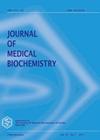脓毒性休克患者的 HCT-ALB、SmtO2、CRT 和 Lac 与肾功能损伤和预后的相关性
IF 2
4区 医学
Q4 BIOCHEMISTRY & MOLECULAR BIOLOGY
引用次数: 0
摘要
背景:本研究探讨脓毒性休克患者的血细胞比容(HCT)和血清白蛋白(ALB)水平差异(HCT-ALB)、肌肉组织氧饱和度(SmtO2)、毛细血管再充盈时间(CRT)和血乳酸(Lac)与肾功能损伤严重程度和预后的相关性。研究方法研究时间为2022年2月至2024年2月,研究对象包括在安徽医科大学第一附属医院接受治疗的116名脓毒性休克患者。根据患者是否出现急性肾损伤将其分为几组:急性肾损伤组包括 40 名患者,其余 76 名患者为非肾损伤组。比较了各组的 HCT-ALB、SmtO2、CRT 和 Lac 水平。对患者进行随访,以评估其28天的存活结果;75名存活患者被归入存活组,41名死亡患者被归入死亡组。分析两组患者的临床数据以及HCT-ALB、SmtO2、CRT和Lac水平的差异,以探讨这些指标与患者预后的关系。结果显示与非肾损伤组相比,急性肾损伤组的HCT-ALB、CRT和Lac水平较高,而SmtO2较低(P<0.05)。同样,与存活组相比,死亡组的 HCT-ALB、CRT 和 Lac 水平较高,而 SmtO2 水平较低(P<0.05)。单变量和多变量分析表明,HCT-ALB、SmtO2、CRT 和 Lac 对患者的生存结果有显著影响,对患者死亡率有很高的预测价值,其 AUC 值分别为 0.834、0.782、0.903 和 0.918。综合应用这些指标预测患者死亡率的 AUC 值为 0.985,高于单独使用这些指标时的 AUC 值。结论急性肾损伤患者和死亡患者的 HCT-ALB、SmtO2、CRT 和 Lac 显著升高,与脓毒性休克的严重程度和预后密切相关。这些指标可作为评估这些患者病情和预后的重要生物标志物。本文章由计算机程序翻译,如有差异,请以英文原文为准。
Correlation of HCT-ALB, SmtO2, CRT and Lac with renal impairment and prognosis in patients with septic shock
Background: This study investigates the correlation between the difference in hematocrit (HCT) and serum albumin (ALB) levels (HCT-ALB), muscle tissue oxygen saturation (SmtO2), capillary refill time (CRT), and blood lactate (Lac) with the severity of renal function damage and prognosis in patients with septic shock.
Methods: Conducted from February 2022 to February 2024, this study included 116 septic shock patients treated at the First Affiliated Hospital of Anhui Medical University. Patients were divided into groups based on whether they developed acute kidney injury: 40 patients were included in the acute kidney injury group, and the remaining 76 were placed in the non-kidney injury group. The levels of HCT-ALB, SmtO2, CRT, and Lac were compared between the groups. Patients were followed up to assess their 28-day survival outcomes; 75 surviving patients were placed in the survival group, and 41 deceased patients in the death group. Differences in clinical data and levels of HCT-ALB, SmtO2, CRT, and Lac between the two groups were analyzed to explore the relationship of these indicators with patient prognosis.
Results: Levels of HCT-ALB, CRT, and Lac were higher, while SmtO2 was lower in the acute kidney injury group compared to the non-kidney injury group (P<0.05). Similarly, the death group exhibited higher levels of HCT-ALB, CRT, and Lac and lower SmtO2 levels compared to the survival group (P<0.05). Univariate and multivariate analyses revealed that HCT-ALB, SmtO2, CRT, and Lac significantly impact patient survival outcomes, demonstrating high predictive value for patient mortality with respective AUC values of 0.834, 0.782, 0.903, and 0.918. The combined application of these indicators for predicting patient mortality had an AUC value of 0.985, which is higher than when the indicators were used individually.
Conclusion: HCT-ALB, SmtO2, CRT, and Lac are significantly elevated in patients with acute kidney injury and deceased patients, closely correlating with the severity and prognosis of septic shock. These indicators can serve as important biomarkers for assessing the condition and prognosis of these patients.
求助全文
通过发布文献求助,成功后即可免费获取论文全文。
去求助
来源期刊

Journal of Medical Biochemistry
BIOCHEMISTRY & MOLECULAR BIOLOGY-
CiteScore
3.00
自引率
12.00%
发文量
60
审稿时长
>12 weeks
期刊介绍:
The JOURNAL OF MEDICAL BIOCHEMISTRY (J MED BIOCHEM) is the official journal of the Society of Medical Biochemists of Serbia with international peer-review. Papers are independently reviewed by at least two reviewers selected by the Editors as Blind Peer Reviews. The Journal of Medical Biochemistry is published quarterly.
The Journal publishes original scientific and specialized articles on all aspects of
clinical and medical biochemistry,
molecular medicine,
clinical hematology and coagulation,
clinical immunology and autoimmunity,
clinical microbiology,
virology,
clinical genomics and molecular biology,
genetic epidemiology,
drug measurement,
evaluation of diagnostic markers,
new reagents and laboratory equipment,
reference materials and methods,
reference values,
laboratory organization,
automation,
quality control,
clinical metrology,
all related scientific disciplines where chemistry, biochemistry, molecular biology and immunochemistry deal with the study of normal and pathologic processes in human beings.
 求助内容:
求助内容: 应助结果提醒方式:
应助结果提醒方式:


